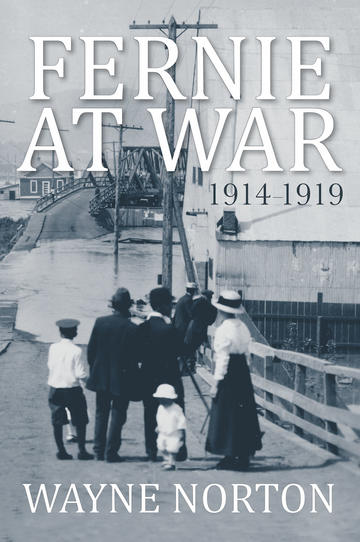About BC Books Online
BC Books Online was created for anyone interested in BC-published books, and with librarians especially in mind. We'd like to make it easy for library staff to learn about books from BC publishers - both new releases and backlist titles - so you can inform your patrons and keep your collections up to date.
Our site features print books and ebooks - both new releases and backlist titles - all of which are available to order through regular trade channels. Browse our subject categories to find books of interest or create and export lists by category to cross-reference with your library's current collection.
A quick tip: When reviewing the "Browse by Category" listings, please note that these are based on standardized BISAC Subject Codes supplied by the books' publishers. You will find additional selections, grouped by theme or region, in our "BC Reading Lists."
 Enlarge Cover
Enlarge Cover
From "enemy alien" internment camps to WWI disillusionment - these are the five pivotal years that shaped Fernie, BC, a city instrumental to the national identity of Canada. Fernie, a small community located in BC's Kootenay region, entered the First World War in 1914 with optimism and a sense of national pride-it emerged five years later having experienced staggering losses and multiple controversies that threatened to tear their community apart. As a resource-based economy with unusually large and varied immigrant populations, and exceptionally high recruitment levels, Fernie was profoundly affected by conflicting impulses of labour, loyalty and ethnicity. Demands for internment of enemy aliens, resistance to prohibition and moral reform, the consequences of natural and man-made disasters, the unprecedented banning of recruitment, and the western labour revolt were all issues that contributed to a war-time experience for Fernie that was more dramatic and more revealing of underlying tensions than that of any other Canadian community. In his new book, Fernie at War, historian and author Wayne Norton explores what it meant to live in Fernie during those confusing and divisive years.
Wayne Norton was born in Calgary, raised as an Air Force brat in Canada and Scotland, and now lives in Victoria, BC. Wayne’s teaching career in British Columbia and England involved classes ranging from Kindergarten to Grade 12 in subjects such as music, special education and history. More recently, he worked as a research consultant for the Indian Residential School Resolution Process. With degrees in history from Simon Fraser University and the University of British Columbia, Wayne enjoys exploring neglected topics. In his many published books and articles Wayne has delved into Canadian music from the Great War, women’s ice hockey, public health, and the local histories of Kamloops and Fernie. His most recent book, Fernie at War: 1914-1919, won the Community History Award from the BC Historical Federation. Wayne is a member of historical associations in Victoria and Fernie. He notes that his three young grandchildren continue to delight—even as they remind him how quickly time passes by.
- Winner, Community History Award - British Columbia Historical Federation
“Wayne Norton provides a fascinating story of a British Columbia resource town navigating its way through the tribulations of the Great War. In so doing, he adds to the small but growing body of works that examine the home front experiences of Canadians during the world wars […] This is a book with many strengths…”
—R. Scott Sheffield, BC Studies
“Fernie at War is undoubtedly the most important historic examination of the Great War years’ impact on this town ever done. Norton’s careful and thorough research is key to helping the average ‘Fernieite’ understand how events unfolded through those divisive six years.”
—John Kinnear, The Fernie Free Press
“Fernie at War provides an important contribution to our provincial—and national—history…. [It] succeeds in offering a carefully researched, lovingly crafted regional history…”
—BC History
"Fernie at War is a fine example of how labour and popular history can be presented in an accessible and highly readable manner. The book compels those interested in preserving BC's rich labour heritage to redouble their efforts in locating and preserving the union records that do not already exist in archives. They are the raw material of future histories such as this."
—Donna Sacuta, Executive Director of the BC Labour Heritage Centre, in Our Times
“Norton’s book not only sets a new standard for local histories, it causes us to reconsider the history of every community.”
—Dave Obee, Times Colonist
“Norton’s discussions on prohibition may be the best illustration of the risks entailed in an attempt to sever a community from its broader geographical context for individualized study … The quantity and quality of Norton’s research, and the conclusions drawn therefrom, have resulted in a valuable study. And this work raises an important question, as good works of history should. Norton captured the significance of daily life in a small but rather complex community.”
—Keith Regular, The Ormsby Review


